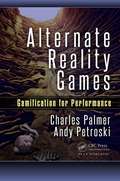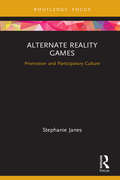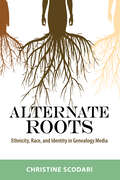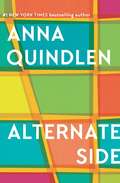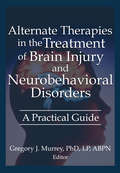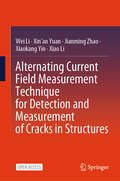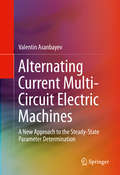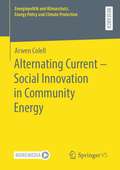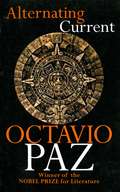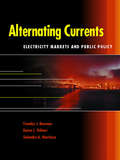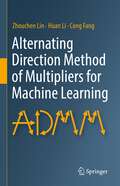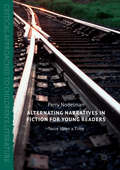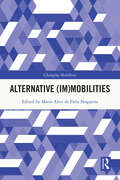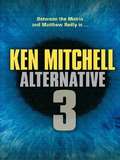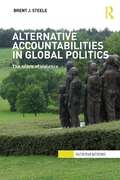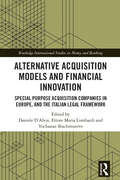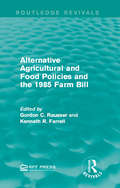- Table View
- List View
Alternate Reality Games: Gamification for Performance
by Charles Palmer Andy PetroskiWhile formal training and communication are a foundational approach to developing employees in the workplace, alternate reality games (ARGs) provide a framework for increased and sustained engagement within business organizations. ARGs are transmedia experiences designed to generate engagement and immersive learning beyond what is achieved in forma
Alternate Reality Games: Promotion and Participatory Culture (Routledge Critical Advertising Studies)
by Stephanie JanesUsing textual analysis, interviews with game designers, audience surveys, and close analysis of player forum discussion, this book examines the unique nature of the producer/consumer relationship within promotional Alternate Reality Games (ARGs). Historically, ARGs are rooted in advertising as much as they are in narrative storytelling. As designers often have to respond to player actions as the game progresses, players can have an impact on the storyline, on character behaviour, and potentially on the final resolution of the narrative. This book explores how both media consumers and producers are responding to this new reconfiguration of the producer/consumer/prosumer dynamic in order to better understand the diverse advertising experiences available to media audiences today. With a focus on participatory culture and the political economy of promotional communications, this in-depth analysis of ARGs will appeal to academics and researchers in the fields of games, film, advertising, and media and cultural studies.
Alternate Roots: Ethnicity, Race, and Identity in Genealogy Media (Race, Rhetoric, and Media Series)
by Christine ScodariIn recent years, the media has attributed the increasing numbers of people producing family trees to the aging of baby boomers, a sense of mortality, a proliferation of Internet genealogy sites, and a growing pride in ethnicity. A spate of new genealogy-themed television series and Internet-driven genetic ancestry testing services have now emerged, capitIn recent years, the media have attributed the increasing numbers of people producing family trees to the aging of baby boomers, a sense of mortality, a proliferation of Internet genealogy sites, and a growing pride in ethnicity. A spate of new genealogy-themed television series and Internet-driven genetic ancestry testing services have now emerged, capitalizing on the mapping of the human genome in 2003. This genealogical trend poses a need for critical analysis, particularly along lines of race and ethnicity. In contextual ways, as she intersperses an account of her own journey chronicling her Italian and Italian American family history, Christine Scodari lays out how family historians can understand intersections involving race and/or ethnicity and other identities inflecting families. Through engagement in and with genealogical texts and practices, such as the classic television series Roots, Ancestry.com, and Henry Louis Gates’s documentaries, Scodari also explains how to interpret their import to historical and ongoing relations of power beyond the family. Perspectives on hybridity and intersectionality gesture toward making connections not only between and among identities, but also between localized findings and broader contexts that might, given only cursory attention, seem tangential to chronicling a family history. Given current tools, texts, practices, cultural contexts, and technologies, Scodari’s study determines whether a critical genealogy around race, ethnicity, and intersectional identities is viable. She delves into the implications of adoption, orientation, and migration while also investigating her own genealogy, examining the racial, ethnic experiences of her forebears and positioning them within larger, cross-cultural contexts.There is little research on genealogical media in relation to race and ethnicity. Thus, Scodari blends cultural studies, critical media studies, and her own genealogy as a critical pursuit to interrogate issues bound up in the nuts-and-bolts of engaging in family history.alizing on the mapping of the human genome in 2003. This genealogical trend poses a need for critical analysis, particularly along lines of race and ethnicity.In contextual ways, Christine Scodari lays out how family historians can understand intersections involving race and/or ethnicity within families. Through engagement in and with genealogical texts and practices, such as the classic television series Roots, Ancestry.com, and Henry Louis Gates’ documentaries, Scodari also explains how to decipher their import to historical and ongoing relations of power beyond the family. Perspectives on hybridity and intersectionality gesture toward making connections not only between and among identities, but also between localized findings and broader contexts that might, given only cursory attention, seem tangential to chronicling a family history.Given current tools, texts, practices, cultural contexts, and technologies, Scodari’s study determines whether a critical genealogy around race, ethnicity, and intersectional identities is viable. She delves into the implications of adoption, orientation, and migration while also investigating her own genealogy, examining the racial, ethnic experiences of her forebears and positioning them within larger, cross-cultural contexts.There is little research on genealogical media in relation to race and ethnicity. Thus, Scodari blends cultural studies, critical media studies, and her own genealogy as a critical pursuit to interrogate issues bound up in the nuts-and-bolts of engaging in family history.
Alternate Side
by Anna QuindlenFor fans of Elizabeth Strout and Anne Tyler comes a brilliantly provocative novel from the Richard and Judy Book Club and Number One bestselling author Anna Quindlen. Anna Quindlen follows her highly-praised novel Miller’s Valley – ‘reads like a companion to Elizabeth Strout’s Olive Kitteridge’, Elisabeth Egan – with a captivating novel about money, class and self-discovery set in the heart of New York where the tensions in a tight-knit neighbourhood—and a seemingly happy marriage—are exposed by an unexpected act of violence. There are days when Nora Nolan thinks that she and her husband, Charlie, lead a charmed life—except when there’s a crisis at work, a leak in the roof at home or a problem with their twins at college. And why not? New York City was once Nora’s dream destination and her clannish dead-end block has become a safe harbour, a tranquil village amid the urban craziness. The owners watch one another’s children grow up. They use the same handyman. They trade gossip and gripes, and they manoeuvre for the ultimate status symbol: a spot in the block’s small parking lot. Then one morning, Nora returns from her run to discover that a terrible incident has shaken the neighbourhood, and the enviable dead-end block turns into a potent symbol of a divided city. The fault lines begin to open: in their street, at Nora’s place of work in a jewellery museum and, most especially, in her marriage. With an unerring and acute eye that captures beautifully the snap and crackle of modern life, Anna Quindlen explores what it means to be a mother, a wife and a woman at a moment of reckoning. ‘Qualities and shades of love are this writer’s strong suit, and she has the unusual talent for writing about them with so much truth and heart that one is carried away on a tidal wave of involvement and concern’ Elizabeth Jane Howard 'Mesmerizing. Quindlen makes her characters so richly alive, so believable, that it’s impossible not to feel every doubt and dream they harbour . . . Overwhelmingly moving’ New York Times
Alternate Side: A Novel
by Anna QuindlenThe tensions in a tight-knit neighborhood—and a seemingly happy marriage—are exposed by an unexpected act of violence. A provocative novel about money, class, and self-discovery, from the #1 New York Times bestselling author of Miller’s Valley and Still Life with Bread Crumbs. Some days Nora Nolan thinks that she and her husband, Charlie, lead a charmed life—except when there’s a crisis at work, a leak in the roof at home, or a problem with their twins at college. And why not? New York City was once Nora’s dream destination, and her clannish dead-end block has become a safe harbor, a tranquil village amid the urban craziness. The owners watch one another’s children grow up. They use the same handyman. They trade gossip and gripes, and they maneuver for the ultimate status symbol: a spot in the block’s small parking lot. Then one morning, Nora returns from her run to discover that a terrible incident has shaken the neighborhood, and the enviable dead-end block turns into a potent symbol of a divided city. The fault lines begin to open: on the block, at Nora’s job, especially in her marriage. With an acute eye that captures the snap crackle of modern life, Anna Quindlen explores what it means to be a mother, a wife, and a woman at a moment of reckoning.
Alternate Side: A Novel
by Anna QuindlenFor fans of Elizabeth Strout and Anne Tyler comes a brilliantly provocative novel from the Richard and Judy Book Club and Number One bestselling author Anna Quindlen. 'Mesmerizing. Quindlen makes her characters so richly alive, so believable, that it’s impossible not to feel every doubt and dream they harbour . . . Overwhelmingly moving’ New York Times Anna Quindlen follows her highly-praised novel Miller’s Valley – ‘reads like a companion to Elizabeth Strout’s Olive Kitteridge’, Elisabeth Egan – with a captivating novel about money, class and self-discovery set in the heart of New York where the tensions in a tight-knit neighbourhood—and a seemingly happy marriage—are exposed by an unexpected act of violence. There are days when Nora Nolan thinks that she and her husband, Charlie, lead a charmed life—except when there’s a crisis at work, a leak in the roof at home or a problem with their twins at college. And why not? New York City was once Nora’s dream destination and her clannish dead-end block has become a safe harbour, a tranquil village amid the urban craziness. The owners watch one another’s children grow up. They use the same handyman. They trade gossip and gripes, and they manoeuvre for the ultimate status symbol: a spot in the block’s small parking lot. Then one morning, Nora returns from her run to discover that a terrible incident has shaken the neighbourhood, and the enviable dead-end block turns into a potent symbol of a divided city. The fault lines begin to open: in their street, at Nora’s place of work in a jewellery museum and, most especially, in her marriage. With an unerring and acute eye that captures beautifully the snap and crackle of modern life, Anna Quindlen explores what it means to be a mother, a wife and a woman at a moment of reckoning. ‘Qualities and shades of love are this writer’s strong suit, and she has the unusual talent for writing about them with so much truth and heart that one is carried away on a tidal wave of involvement and concern’ Elizabeth Jane Howard 'I’m a big fan of US author Anna Quindlen’s sharp writing. Her latest novel, Alternate Side, is a clear-eyed look at a long marriage, written with wit and warmth' Good Housekeeping 'A book about being a mother, a wife and a woman at a moment of reckoning, this is an acutely observed story' Stylist Books
Alternate Sides
by Marissa PiesmanNina's boyfriend is a murder suspect and she risks everything just to prove he is innocent.
Alternate Therapies in the Treatment of Brain Injury and Neurobehavioral Disorders: A Practical Guide
by Barbara L Wheeler Ethan B Russo Margaret Ayers Susan Schaefer Gregory MurreyGet the tools to provide more effective treatment for the neurobehaviorally disordered TBI patient!As traditional treatment success rates for many persons with traumatic brain injury (TBI) are proving less than effective, clinicians search for other therapies that may be more productive. Alternate Therapies in the Treatment of Brain Injury and Neurobehavioral Disorders: A Practical Guide discusses at length various nontraditional treatment approaches such as music therapy, art therapy, EEG biofeedback, and others that may provide additional help for the neurobehaviorally disordered TBI patient.This text provides a practical, in-depth overview of a range of nontraditional interventions and therapies. Each treatment is extensively discussed with explanations on how it can be effectively applied in rehabilitation programs. Models, case samples, contacts, and lists of training programs and professional organizations are given for each therapeutic modality. Each chapter has clear, illustrative drawings, tables, and charts, as well as comprehensive references for further research.Alternate Therapies in the Treatment of Brain Injury and Neurobehavioral Disorders: A Practical Guide discusses these alternative treatments: horticulture therapy art therapy music therapy melodic intonation therapy recreational therapy chemical dependency treatment real time EEG feedback craniosacral therapyThis book is a comprehensive source for nontraditional therapies essential for physicians; neuropsychologists; psychiatrists; rehabilitation specialists; hospital directors, administrators, and TBI professionals.
Alternate Warriors
by Mike ResnickWhat if history's great peacemakers had chosen bloodier destinies? Mother Teresa, Susan B. Anthony, Gandhi, Saint Francis of Assisi, Martin Luther King, Jr. - what if they had fought back?
Alternating Current (AC) Heating for Lithium-Ion Batteries in Electric Vehicles: Heating Principles, Modeling, and Implementation
by Jiangong Zhu Ranjun Huang Haifeng DaiThis book provides a comprehensive and innovative exploration of low-temperature AC heating techniques for lithium-ion batteries, addressing a critical challenge in electric vehicle (EV) performance. By integrating theoretical insights, experimental validations, and advanced modeling approaches, it offers a systematic framework to understand and optimize battery heating under cold conditions. The book introduces novel methodologies, such as square wave AC heating and impedance-based thermal analysis, which significantly enhance heating efficiency while mitigating degradation risks like lithium plating. With a focus on practical implementation, it also presents cutting-edge solutions for AC heating system design, including integrated charger and self-heating battery pack configurations.The intended readership includes researchers, engineers, and industry professionals in the fields of battery technology, electric vehicles, and thermal management systems. Written at an advanced level, the book bridges the gap between academic research and industrial applications, making it a valuable resource for both theoretical understanding and practical innovation.
Alternating Current Field Measurement Technique for Detection and Measurement of Cracks in Structures
by Wei Li Xiao Li Xin'an Yuan Jianming Zhao Xiaokang YinThis open access book serves as a comprehensive exploration of Alternating Current Field Measurement (ACFM), encompassing the foundational theory crucial for subsequent chapters, as well as the design and testing of ACFM probes, instruments, and software. Providing guidance and serving as a reference for ACFM instrument development, the text delves into visualization research in ACFM, offering valuable insights for technical engineering applications. Nondestructive testing (NDT) emerges as a pivotal method for detecting and assessing defects, offering support for safety pre-warning and maintenance decisions in industrial structures. Originating from the 1980s, the demand for an NDT technique arose to inspect fatigue cracks at welded intersections in offshore underwater structures in the North Sea. Conventional NDT methods proved impractical in this distinct underwater environment with quantitative evaluation requirements, prompting the development of the ACFM technique by researchers in the mechanical engineering department at University College London. Over the past four decades, ACFM's theory model, inspection methods, and equipment have undergone rapid advancements, gaining widespread utilization in ocean engineering, the power industry, rail traffic, and special equipment fields. This book encompasses diverse facets, including the global development history of alternating current field measurement technology, core basic theory, signal processing methods, probe instrument development, standardization construction, and engineering applications. Serving as a valuable learning reference for students and offering fundamental theoretical guidance for scientific researchers, it also provides case introductions for engineering applications. The book aims to propel both theoretical research and practical applications of alternating current field measurement technology, contributing significantly to its popularization and widespread application.
Alternating Current Multi-Circuit Electric Machines: A New Approach to the Steady-State Parameter Determination
by Valentin AsanbayevThis book details an approach for realization of the field decomposition concept. The book presents the methods as well as techniques and procedures for establishing electric machine circuit-loops and determining their parameters. The methods developed have been realized using the models of machines with laminated and solid rotor having classical structure. The use of such models are well recognized and simplifies practical implementation of the obtained results.
Alternating Current – Social Innovation in Community Energy (Energiepolitik und Klimaschutz. Energy Policy and Climate Protection)
by Arwen ColellCommunity energy projects give their own answers to the challenges of energy system change: They are social innovations. By building new relations between local economies, communities and technical infrastructures, these projects not only change the energy system but also respective power structures. Drawing on case studies from Germany, Denmark and Scotland, this book shows the importance of community ties, and shared symbols for successful processes of transformation and develops recommendations for policy decision-makers.
Alternating Current: Conjunctions And Disjunctions - Marcel Duchamp - Appearance Stripped Bare - The Monkey Grammarian - On Poets And Others - Alternating Current (Arcade Classics Ser.)
by Octavio PazA key figure in the Latin American literary renaissance, Octavio Paz focuses here on literature and art, drugs, the murder of God, and ethical and political problems.
Alternating Currents: Electricity Markets and Public Policy
by Timothy J. Brennan Karen L. Palmer Salvador A. MartinezMany states within the U.S., and many countries across the world, are opening their electicity markets to competition. Many others are uncertain about their plans. These differences emphasize the complexities involved in the technology and regulatory structure of the electricity industry--an industry for which the introduction of market competition has been notoriously difficult. In response to these challenges, Alternating Currents provides a timely overview and analysis of the concerns facing industry regulators, legislators, and others as they consider whether, when, and how to open electricity markets. Authors Brennan, Palmer, and Martinez offer background on the history of regulatory policy and the technology for producing and delivering electric power. They then provide insights into the policy debates and economic issues involved in eleven important topics, including industry structure, system integrity and reliability, the mitigation of market power, and environmental protection. Alternating Currents describes the recent events leading to the demise of retail competition in California with the intent on drawing lessons for the future. In the end, the authors offer their perspective about what makes electricity a unique resource and how those factors make the potential conflict between competition and reliability the most pressing of the long-term concerns about the transformation of the electric power industry.
Alternating Direction Method of Multipliers for Machine Learning
by Zhouchen Lin Huan Li Cong FangMachine learning heavily relies on optimization algorithms to solve its learning models. Constrained problems constitute a major type of optimization problem, and the alternating direction method of multipliers (ADMM) is a commonly used algorithm to solve constrained problems, especially linearly constrained ones. Written by experts in machine learning and optimization, this is the first book providing a state-of-the-art review on ADMM under various scenarios, including deterministic and convex optimization, nonconvex optimization, stochastic optimization, and distributed optimization. Offering a rich blend of ideas, theories and proofs, the book is up-to-date and self-contained. It is an excellent reference book for users who are seeking a relatively universal algorithm for constrained problems. Graduate students or researchers can read it to grasp the frontiers of ADMM in machine learning in a short period of time.
Alternating Electric Fields Therapy in Oncology: A Practical Guide to Clinical Applications of Tumor Treating Fields
by Eric T. WongThis concise text provides acomplete overview of alternating electric fields therapy -- also known as tumortreating fields -- for glioblastoma and other types of solid tumormalignancies. Readers are given a fundamental understanding of this novelanti-cancer treatment modality by learning from clinical trial data as well asthe physical and cell biology effects on tumor cells when alternating electricfields are applied both in vitro and in vivo. Chapters illustrate the physicsbehind electric field propagation in space and other media. This isfollowed by a review of our current understanding of the electric field effectson dividing cells - including the disruption of cytokinesis, proper chromosomesegregation and activation on the cell surface chaperons that induceimmunogenic cell death. Data from phase III trials for the treatment ofrecurrent and newly diagnosed glioblastomas are included, as well as some ofthe ancillary post hoc analyses that were performed by variousinvestigators. The remainder of the chapter covers other solid tumormalignancies, including non-small cell lung cancer, pancreatic cancer andovarian cancer, as this treatment modality is being applied to systemicmalignancies. Alternating Electric FieldsTherapy in Oncology offers oncologists,neurologists, radiation oncologists, biomedical engineers, cell biologists andmitosis researchers the fundamentals needed for clinical practice.
Alternating Narratives in Fiction for Young Readers: Twice Upon a Time (Critical Approaches to Children's Literature)
by Perry NodelmanThis book is about the implications of novels for young readers that tell their stories by alternating between different narrative lines focused on different characters. It asks: if you make sense of fiction by identifying with one main character, how do you handle two or more of them? Do novels with alternating narratives diverge from longstanding conventions and represent a significant change in literature for young readers? If not, how do these novels manage to operate within the parameters of those conventions? This book considers answers to these questions by means of a series of close readings that explore the structural, educational and ideological implications of a variety of American, British, Canadian and Australian novels for children and for young adults.
Alternative (Changing Mobilities)
by Maria Alice de Faria NogueiraBy introducing the new concept of alternative (im)mobilities, this collection draws attention to a different approach to mobility practices. In doing so, this ground-breaking volume explores a range of issues related related to (im)mobilities and the Covid-19 pandemic, transport and social practices, and media and urban tourism. Designed and organized in a legally or illegally way, alternative (im)mobilities are examples of those daily practices of displacement of people, objects, and information, which mobilize a multidisciplinary framework of urbanization, shedding light on important and long-standing issues of inequality and the lack of recognition of diversity in economics, social and culture urban life. This volume opens up a new set of research questions related to the complex ways in which informal actors cope with their everyday life experience, regarding dwelling, commuting, working, caring of vulnerable people, health issues, access to information, among other mobility practices, besides the lack of essential – and infrastructural - public services. This volume will be of great interest to researchers and scholars in geography and the social sciences interested in mobilities, transport, communication, tourism, mobility justice and inequality, public decision making and health studies.
Alternative 3
by Ken MitchellConspiracy theories. You've heard them all before, right?But what if you came across clues that made you think otherwise? On parole for cyber hacking, Curtis Hatch has been offered a million bucks to find the origins of two mysterious video clips posted on a conspiracy theory website. Easy money for someone with his unique talents. But soon two people close to him are dead, and the babe he's falling for seems to be packing more than just a few secrets. Curtis learns a couple of things fast: when powerful people are hiding something this big, the only person you can trust is yourself. And that sometimes the best form of defence is attack. This heart-thumping suspense thriller weaves Nazis, UFOs, end-of-the-world prophesies and government cabals into the mother of all conspiracies. And like its hero with an MP3 player and an attitude, Alternative 3 won't let you go ... until the truth is finally revealed.
Alternative Accountabilities in Global Politics: The Scars of Violence (Interventions)
by Brent J. SteeleIn fields such as politics, international relations, public administration and international law, there is a rapidly growing interest in the topic of ‘accountability’. In this innovative new work, Steele shows how we might recognize how an alternative form of accountability in global politics has been present for some time, and that, furthermore, this form’s continued presence remains one of the most politically powerful, if not endurable, possibilities for resistance in the near future. This book argues that the physical and visually shocking outcomes of violence found on the bodies of humans, as well as the buildings and landscapes which surround us, specifically the scars they leave behind, remain one of our most compelling forms of accountability. Steele develops the theoretical argument on scars and exteriority utilizing insights from several philosophical and theoretical resources including Hannah Arendt, Erving Goffmann, and Richard Rorty. The work examines scars and their effects through several illustrations, including the accounts of Emmett Till, Iranian protestor Neda Agha-Soltan, the Syrian boy Hamza al-Khateeb, the massacre in WWII and then memorializing throughout the 20th century of the Lidice children in the modern-day Czech Republic, the particular architecturally destructive outcomes of the 2008-9 Gaza War, the loss of the Twin Towers in New York, as well as a variety of violent scars found on the landscapes of Europe and Southeast Asia. Emphasizing the importance of the space and ‘time’ of scars, the book illustrates how an alternative form of accountability in the scar can be a useful, disruptive, spontaneous, but also creative practice to challenge the discourses of violence which remain with us today.
Alternative Acquisition Models and Financial Innovation: Special Purpose Acquisition Companies in Europe, and the Italian Legal Framework (Routledge International Studies in Money and Banking)
by Yochanan Shachmurove Daniele D’Alvia Ettore Maria LombardiThis is the first book written in English on special purpose acquisition companies (SPACs) in the context of European and Italian financial law, introducing the topic with a general overview on the European stage. It is also the first book on European financial regulations of SPACs. As such, it is a groundbreaking reference text for SPAC studies at the international level. Alternative Acquisition Models and Financial Innovation: Special Purpose Acquisition Companies in Europe, and the Italian Legal Framework offers the most comprehensive overview of the current international financial regulations of SPACs in the EU and UK compared to the main legal system where SPACs originated—the US. This edited book is focused on finding a European legal framework for SPACs by discovering whether the Alternative Investment Fund Managers Directive (AIFMD) or the Undertakings for the Collective Investment in Transferable Securities Directive (UCITS) are applicable to them and why, as well as identifying the objectives of financial regulation of SPACs in the EU, US and UK. Essentially, the edited collection explores soft law and self-regulation instances against the state-based Westphalian approaches centred on hard law instances; describes practical examples of SPACs in Italy and Europe; and analyses the limits and perspectives of such investment vehicles on the Italian capital market as well as their possible uses as forms of shadow banking and venture companies at international levels.
Alternative Ageing: How To Stay Looking and Feeling Younger For Longer
by Suzi Grant'Suzi Grant knows the secrets of youth' The TimesLOOK AND FEEL YOUR BEST IN 2020 WITH ALTERNATIVE AGEING - THE NATURAL WAY TO FEEL YOUNG AGAINSuzi Grant is in her late sixties but you wouldn't know it. Still living life to the full, she knows the secrets of looking and feeling fabulous for ever. A leading blogger and researcher into ageing, Suzi has created this easy Alternative Ageing action plan to give you more energy and vitality. Inside you'll discover:- What foods to eat and avoid- How to keep your skin glowing- How to naturally boost your hormones- Easy fitness exercises- Simple stress busters- An average alternative-ageing day Follow the tips in Alternative Ageing and you'll soon discover a new you who looks and feels great and runs rings around your children - and even grandchildren.It's time to feel young all over again.
Alternative Agricultural and Food Policies and the 1985 Farm Bill (Routledge Revivals)
by Gordon C. Rausser and Kenneth R. FarrellIn 1985, the U.S. Congress confronted the difficult and complex task of developing a 5-year omnibus legislation allowing for lower commodity prices. But, policies predicated on the concept of agriculture as a unique sector of the economy became less and less appropriate to the highly interdependent, open agricultural economy throughout the 1980s. First published in 1985, this collection of 16 papers and related discussions contained in these proceedings is an important contribution toward understanding the issues, options, and dilemmas in U.S. agricultural policy. This is an ideal title for students interested in environmental studies, agriculture, and national policy.
